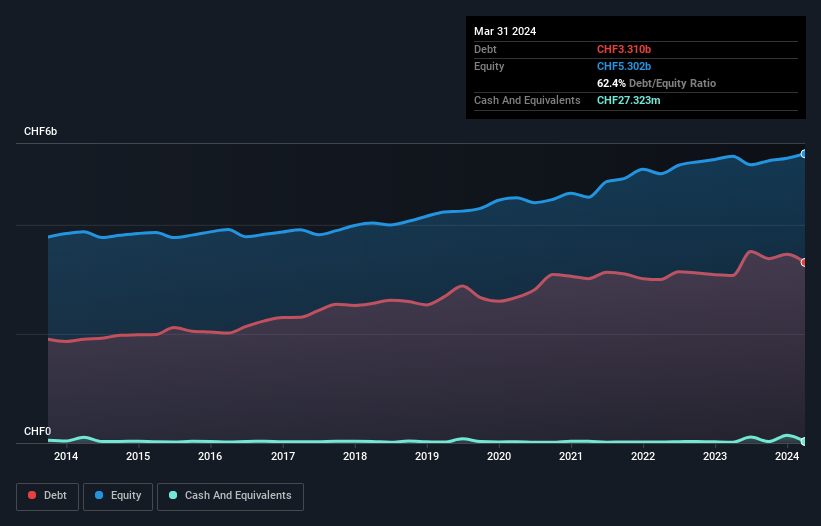Howard Marks put it nicely when he said that, rather than worrying about share price volatility, 'The possibility of permanent loss is the risk I worry about... and every practical investor I know worries about.' When we think about how risky a company is, we always like to look at its use of debt, since debt overload can lead to ruin. Importantly, PSP Swiss Property AG (VTX:PSPN) does carry debt. But is this debt a concern to shareholders?
What Risk Does Debt Bring?
Generally speaking, debt only becomes a real problem when a company can't easily pay it off, either by raising capital or with its own cash flow. In the worst case scenario, a company can go bankrupt if it cannot pay its creditors. However, a more usual (but still expensive) situation is where a company must dilute shareholders at a cheap share price simply to get debt under control. Of course, plenty of companies use debt to fund growth, without any negative consequences. The first step when considering a company's debt levels is to consider its cash and debt together.
Check out our latest analysis for PSP Swiss Property
What Is PSP Swiss Property's Net Debt?
The image below, which you can click on for greater detail, shows that at March 2024 PSP Swiss Property had debt of CHF3.31b, up from CHF3.07b in one year. And it doesn't have much cash, so its net debt is about the same.

How Strong Is PSP Swiss Property's Balance Sheet?
We can see from the most recent balance sheet that PSP Swiss Property had liabilities of CHF438.9m falling due within a year, and liabilities of CHF3.98b due beyond that. Offsetting these obligations, it had cash of CHF27.3m as well as receivables valued at CHF38.1m due within 12 months. So it has liabilities totalling CHF4.36b more than its cash and near-term receivables, combined.
This deficit is considerable relative to its market capitalization of CHF5.46b, so it does suggest shareholders should keep an eye on PSP Swiss Property's use of debt. This suggests shareholders would be heavily diluted if the company needed to shore up its balance sheet in a hurry.
We measure a company's debt load relative to its earnings power by looking at its net debt divided by its earnings before interest, tax, depreciation, and amortization (EBITDA) and by calculating how easily its earnings before interest and tax (EBIT) cover its interest expense (interest cover). Thus we consider debt relative to earnings both with and without depreciation and amortization expenses.
Strangely PSP Swiss Property has a sky high EBITDA ratio of 10.8, implying high debt, but a strong interest coverage of 11.1. So either it has access to very cheap long term debt or that interest expense is going to grow! If PSP Swiss Property can keep growing EBIT at last year's rate of 10% over the last year, then it will find its debt load easier to manage. When analysing debt levels, the balance sheet is the obvious place to start. But it is future earnings, more than anything, that will determine PSP Swiss Property's ability to maintain a healthy balance sheet going forward. So if you're focused on the future you can check out this free report showing analyst profit forecasts.
Finally, while the tax-man may adore accounting profits, lenders only accept cold hard cash. So we clearly need to look at whether that EBIT is leading to corresponding free cash flow. Over the last three years, PSP Swiss Property recorded free cash flow worth a fulsome 98% of its EBIT, which is stronger than we'd usually expect. That puts it in a very strong position to pay down debt.
Our View
PSP Swiss Property's net debt to EBITDA was a real negative on this analysis, although the other factors we considered were considerably better. In particular, we are dazzled with its conversion of EBIT to free cash flow. When we consider all the elements mentioned above, it seems to us that PSP Swiss Property is managing its debt quite well. Having said that, the load is sufficiently heavy that we would recommend any shareholders keep a close eye on it. There's no doubt that we learn most about debt from the balance sheet. However, not all investment risk resides within the balance sheet - far from it. These risks can be hard to spot. Every company has them, and we've spotted 3 warning signs for PSP Swiss Property (of which 1 is a bit concerning!) you should know about.
When all is said and done, sometimes its easier to focus on companies that don't even need debt. Readers can access a list of growth stocks with zero net debt 100% free, right now.
New: Manage All Your Stock Portfolios in One Place
We've created the ultimate portfolio companion for stock investors, and it's free.
• Connect an unlimited number of Portfolios and see your total in one currency
• Be alerted to new Warning Signs or Risks via email or mobile
• Track the Fair Value of your stocks
Have feedback on this article? Concerned about the content? Get in touch with us directly. Alternatively, email editorial-team (at) simplywallst.com.
This article by Simply Wall St is general in nature. We provide commentary based on historical data and analyst forecasts only using an unbiased methodology and our articles are not intended to be financial advice. It does not constitute a recommendation to buy or sell any stock, and does not take account of your objectives, or your financial situation. We aim to bring you long-term focused analysis driven by fundamental data. Note that our analysis may not factor in the latest price-sensitive company announcements or qualitative material. Simply Wall St has no position in any stocks mentioned.
About SWX:PSPN
PSP Swiss Property
Owns and manages real estate properties in Switzerland.
Established dividend payer with low risk.
Similar Companies
Market Insights
Community Narratives




